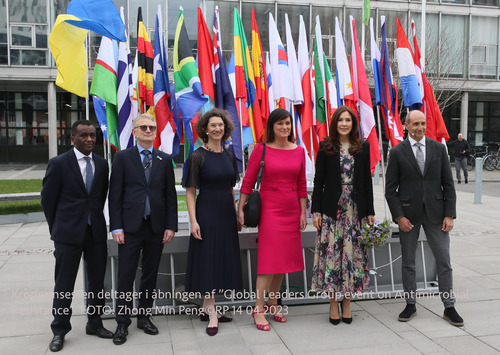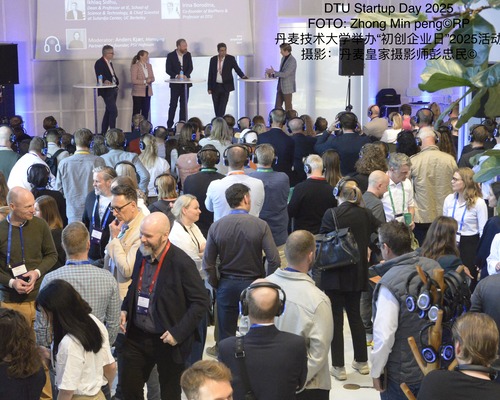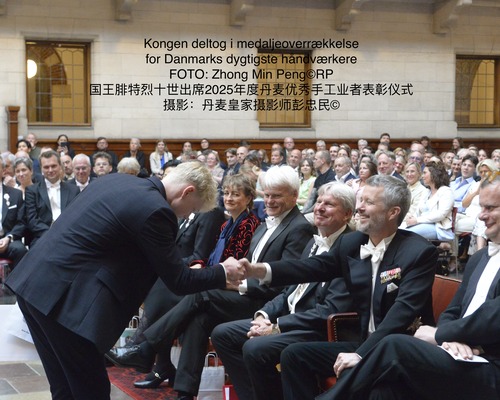AF: Kongehuset ESCMID og Henning Okholm
FOTO. Zhong Min Peng©RP
H.K.H. Kronprinsessen af Danmark har deltaget i åbningen af ”Global Leaders Group event on Antimicrobial Resistance” også tale hun ved åbningen af ”Global Leaders Group event on Antimicrobial Resistance” den 14. april 2023.
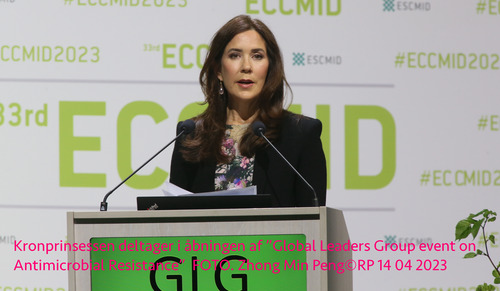
H.K.H. Kronprinsessen deltog den 14. april 2023 i åbningen af ”Global Leaders Group event on Antimicrobial Resistance” i Bella Center i København.
Resistens overfor antibiotika bliver kaldt for “stille pandemi”. Hendes Kongelige Højhed Kronprinsessen holdt tale ved en international højniveau konference i København om AMR (antimikrobiel resistens), som er et stigende globalt problem, der påvirker både menneskers og dyrs sundhed.”
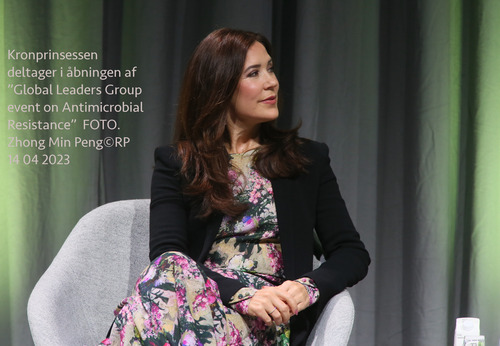
Ved ankomsten til konferencen i Bella Center, som blev afholdt af European Society of Clinical Microbiology and Infectious Diseases (ESCMID), blev Kronprinsessen blandt andet modtaget af indenrigs- og sundhedsminister Sophie Løhde, Maltas vicepremierminister og sundhedsminister H.E. Chris Fearne og præsident for ESMID professor Annelies Zinkernagel.”
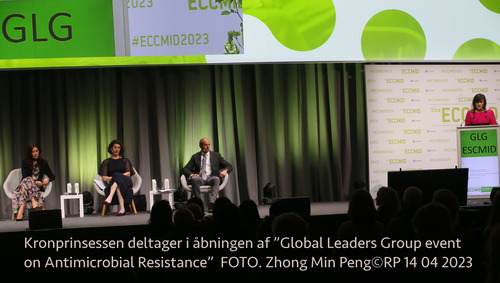
Danmark har i en årrække været et foregangsland i kampen mod antibiotikaresistens både nationalt og internationalt. Indenrigs- og sundhedsminister Sophie Løhde deltog også i konferencen, som har til formål at skabe nye partnerskaber – på tværs af sektorer og landegrænser – til forebyggelse og behandling af AMR.
(ENGLISH)
High-level discussion urges political action for AMR research
Copenhagen local time, Friday 14 April (ESCMID)
Copenhagen, Denmark (14 April 2023) – Today, the Global Leaders Group (GLG) on antimicrobial resistance (AMR) and the European Society of Clinical Microbiology and Infectious Diseases (ESCMID) hosted a forum in which government leaders, policymakers and scientists from across the globe united to address the need for strong partnerships between policy and research in developing solutions for one of the greatest health threats facing our world today, AMR.
As AMR becomes more prominent, antibiotics and other antimicrobial agents become ineffective and infections become difficult or impossible to treat, increasing the risk of disease spread, severe illness and death.
“Today AMR is a global health priority and global governance for AMR has been strengthened with the formation of the Quadripartite collaboration and the Global Leaders Group on AMR, which serves as a driving force for building and continued momentum and political action.AMR is like a complex web of connections that can be hard to untangle. It’s easy to get lost in the technical details and forget about the real-world impact that AMR has on people’s lives. To break through the complexity, we need to find a way to weave together the science and policy with the human stories behind AMR. By doing so, we can better understand the problem and its’ urgency, making it easier for everyone to act against it.“said Her Royal Highness The Crown Princess Mary of Denmark during the forum’s keynote address.
“Research plays a critical role in informing effective and sustainable responses to AMR, yet the sector faces many challenges like lack of financial and human resources. We need to work together in supporting AMR research to ensure the critical development and access to antimicrobials, vaccines and diagnostics.” said Dr. Chris Fearne, vice-chair of the GLG and Deputy Prime Minister of Malta.
“During the COVID-19 pandemic we realized the value of working together and sharing knowledge nationally and internationally amongst clinicians, scientists and policymakers.” said Annelies Zinkernagel, President of ESCMID and professor in infectious diseases and hospital epidemiology at the University Hospital Zurich, University of Zurich, Switzerland. “ESCMID and GLG are building on this momentum by bringing clinicians, scientists and policymakers together to tackle the ongoing AMR epidemic.”
